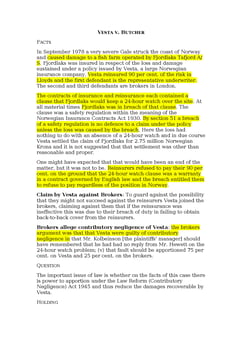Ruxley Electronics and Construction Ltd v Forsyth [1996] AC 344
Judgement for the case Ruxley Electronics and Construction Ltd v Forsyth
KEY POINTS
In breach of contract and the assessment of damages, the measurement of damages, specifically whether the appropriate measure is the reinstatement cost or the diminution in value.
In a building contract, it is established that the performance of the contract was deficient, and this deficiency did not result in a diminution in the value of the swimming pool. The cost of reinstatement is deemed disproportionate to the prospective benefit of such reinstatement.
The breach of contract involves the failure to construct the swimming pool to the specified depth, yet the defect did not diminish the overall value of the swimming pool. The cost of reconstructing the pool should be recoverable as damages, and full reinstatement to the original contractual position is a reasonable remedy.
The owner is entitled to damages aimed at compensating for the loss of amenity or the satisfaction of personal preferences.
FACTS
A contract between an owner and two building companies, R and L, for a swimming pool construction project with a specific depth requirement. The completed pool fell short of the agreed depth. Despite a partial payment, a balance of £39,072 was owed to the builders.
The owner counterclaimed for breach of contract due to the depth discrepancy, but the trial judge ruled that the pool's value hadn't decreased. Therefore, damage was limited. R was awarded £3,903, and L received £36,874. Additionally, the owner was granted £2,500 in general damages for amenity loss.
The owner appealed, seeking greater damages or a deduction from the contract price for reconstruction costs.
The Court of Appeal favored the owner, allowing damages to cover pool replacement expenses, totaling £21,560, despite the pool's unaltered value.
R then appealed this decision to the House of Lords.
JUDGEMENT
If it's unreasonable for the plaintiff to rebuild due to high costs, they can only recover the difference in value. The plaintiff's intent to rebuild affects the extent of the loss; if they don't intend to rebuild, the loss equals the difference in value.
When the breach doesn't reduce the value, awarding reinstatement costs as an alternative to the value difference is unjust. Recovery options aren't limited to reinstatement or value difference. If a breach causes the loss of expected performance, personal preference, or amenity and no value reduction, reasonable damages can be awarded.
The judge rightly decided that the owner's loss didn't warrant full reinstatement due to unreasonable costs. The £2,500 general damages for amenity loss were uncontested. The appeal was allowed, and the judge's ruling was reinstated, overturning the Court of Appeal's decision.
COMMENTARY
A swimming pool construction contract dispute on pool depth specifications. The trial judge found no decrease in the pool's value despite the breach and awarded damages accordingly. The Court of Appeal opted for damages covering pool replacement costs despite the pool's value remaining intact.
The House of Lords clarified that reasonableness matters in cases of defective building works. If reinstatement costs greatly exceed benefits, the plaintiff gets the value difference.
The plaintiff's intent to rebuild is a factor. If not, their loss equals the value difference, if any. Importantly, excessive reinstatement costs aren't justified when the breach doesn't reduce value.
This judgment guides defective building works damages assessment, considering cost-benefit balance, the plaintiff's intent, and fairness. It upheld the trial judge's reasonable decision and confirmed general damages for loss of amenity.
The Court of Appeal's ruling was overturned.
ORIGINAL ANALYSIS
F contracted R to build him a pool for 317K, and R built the pool slightly shallower than specified (although it made very little difference to F’s ability to use the pool). F then claimed £20k in damages to demolish the pool and rebuild it to F’s desired specifications i.e. a cure.
HL rejected F’s claim for the cost of cure, since the cost of cure was “unreasonable”. This was because the cost of cure exceeded the extent of F’s loss. This claim of unreasonableness was supported by the fact that F had no intention of actually remaking the pool, which is evidence that his loss of having a pool slightly shallower than he would have liked is not so great as the value put on the cost of cure.
To award the value of the cost of cure when F does not care enough to effect the cure (i.e. where his loss has been less than the value of curing the defect) would be to overcompensate him. They also said that the cost of cure would be “disproportionate”, given that the pool was no less valuable or workable for its being slightly shallower.
The HL also rejected Defendant’s proposed “diminution in value” approach since it would under compensate Plaintiff (since the pool was no less valuable for its being shallower) and would mean that people’s specifications would be illusory and unenforceable.
Thus HL decided to make an award based on a “loss of amenity” approach, where the value of the promise to the promisee exceeds the financial enhancement that would have occurred had there been full performance i.e. an award can be made for Plaintiff’s personal dissatisfaction even if there is no economic loss.
Lord Lloyd
The court will not allow a plaintiff to “create a loss that does not exist in order to punish the defendants.”
He also says that Parke B’s dictum only applied in cases where there was actually a loss and it does not necessarily impl that the “cost of cure” should always apply, since in cases like this it would place F in a far better position than if the pool had been built according to correct specifications.
----
NB The amenity damages are hard to quantify, since they are necessarily subjective and the court is having to ask itself “how upset is Plaintiff” at not having the exact specifications of the contract. Secondly, it could lead to gross over-compensation where Plaintiff is a sensitive or neurotic person.
RELATED CASES
For Further Study on Ruxley Electronics and Construction Ltd v Forsyth

A collection of the best GDL notes the director of Oxbridge Notes (an O...

These are detailed case summaries (excerpts from cases - not paraphrase...
Need instant answers? Our AI exam tutor is here to help.
Ask questions 🙋 Get answers 📔 It's simple 👁️👄👁️
Our AI is educated by the highest scoring students across all subjects and schools. Join hundreds of your peers today.
Get StartedSimilar Cases
Related Product Samples
These product samples contain the same concepts we cover in this case.
| GDL Contract Law | Remedies Notes (18 pages) |
| Contract Law | Remedies For Breach Pq Notes Notes (25 pages) |
| Commercial Remedies BCL | Ruxley Electronics V. Forsyth Notes (4 pages) |

 Since 2010, Oxbridge Notes has been a trusted education marketplace, supplying high-quality materials from top achievers at universities like Oxford, Cambridge, LSE, Harvard, and Yale.
Since 2010, Oxbridge Notes has been a trusted education marketplace, supplying high-quality materials from top achievers at universities like Oxford, Cambridge, LSE, Harvard, and Yale.